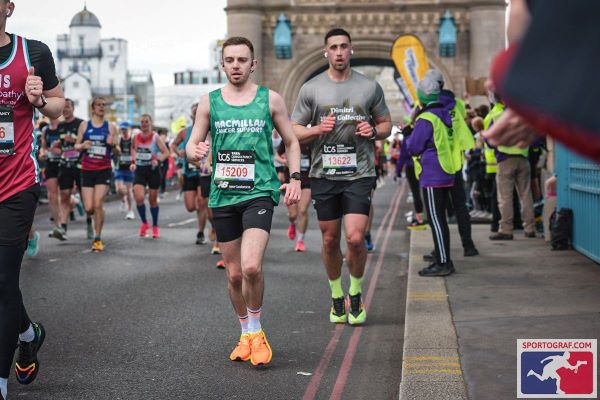“Other people call me inspirational, but I don’t want cancer to define me. I’m just trying my best. I don’t see myself as an inspiration. In my eyes, I’m just doing some running. I don’t want to be known for having cancer, I want to be remembered for all the positive things I do.”
Mason, 28, from Balham was diagnosed with a rare type of brain tumour in September 2022, undergoing emergency brain surgery just a few days after his diagnosis.
Since then, Mason has had to re-learn how to walk, talk, and crucially for Mason, how to run. As a dedicated runner and fitness enthusiast, this side effect hit Mason particularly hard.
After overcoming many challenges to get to this place, Mason is taking on London, New York and Chicago marathons and plans to climb Mount Kilimanjaro in 2024 – just to name a few of his challenges next year.
You can donate to Mason’s fundraising page here, or even join Mason in taking on a challenge in 2024 for Team Macmillan.
You can hear more about Mason’s story on the UKRunChat podcast, out now.
On starting running
“I started running in 2019, when my old boss challenged me to a competition. He went: ‘I bet you can’t run faster than me, and I’ll double my donation if you enter’ kind of thing. I had four weeks to train and I think I came 22nd overall out of a thousand people.”
On being diagnosed with a brain tumour
“In September 2022 I was diagnosed with a high grade cancerous brain tumour. I rang 111 and they said ‘Please go to Kings within the hour’ so I went and didn’t leave for four weeks. I think I was in A&E for 11 hours.”
“It’s just one of them ‘you play the hand you’ve got’ kind of thing. You get it. It’s diagnosed. You have surgery. You do the treatment options they recommend, and you just crack on and you try to make the best out of a bad situation. That’s what I tried to do. When you look around there aren’t a lot of people in the hospital around similar ages. They’re all a lot older.”
“You have a world of information thrown at you. You don’t really know what to do. You don’t know where to turn, or what news to really share with people. You have to process it by yourself. You don’t really want to tell people by calling them or texting them, you want it to be face to face I guess. You don’t really know what to say because at that point you only know the bare details. You haven’t done a lot of research. That’s quite difficult as a 27 year old to process.”
“I had surgery about a week afterwards. Afterwards, I couldn’t really eat, I couldn’t sleep. I was constantly vomiting. I thought I was making perfect sense but no words were coming out. I had to point to what I wanted. That was very degrading. I couldn’t shower by myself. I couldn’t walk anywhere. I couldn’t really speak properly.”
“Recovery was slow at first. It looked like being unaided making a piece of toast or a cup of tea. It was a basic task, but I felt like doing them solo was massive.
“Brain tumours come in 4 main forms: Grade 1, Grade 2 (which are low grade) and Grade 3 and Grade 4 which are high grade, and tend to be more malignant and fast growing. They really impact a range of things you can do. You can usually live a healthy lifestyle around a low grade tumour. When you’ve got a high grade one, it’s a bit more taxing on your body, more tiring, because the treatment you require is more intensive.
“I did chemotherapy last year, and had two weeks off between cycles to really train for a run. Those first runs were a bit lethargic, I didn’t really feel like it. You feel like a normal person but you’re not. You just try to be positive as you can. The symptoms that have affected me are memory, speech, the way I walk, my mannerisms, my nature.”
On fundraising
“The challenges don’t seem that big to me. I just want to make a difference to other people and be a voice for other young people as well.
“I want to reduce the taboo around brain tumours because at the moment people don’t really know much about them. I want to make them mainstream so people can easily talk about them. Someone has to unfortunately pass away for any research to happen on brain tumours.”
On completing the London Marathon
“It’s a race like no other. It’s really humbling to be able to do it and represent a good charity such as Macmillan. Training was sandwiched between treatments. I only had about 2-3 months of no interruptions to just go for it. I told myself to sit down and devise a whole plan around race day: what you want to achieve, what’s your average pace going to be, what’s your backup pace, when are you going to refuel, do you take water or grab water at aid stations. I achieved 3 hours 28 minutes, so I’m just glad that the hard work and training paid off. Some of the training runs were in -10 degrees – I was frozen when I got home – and then other runs were in 25 degree. I think I enjoyed the day a lot more than I let on, from the atmosphere of the crowd. Really like pushing yourself and making them proud because they’ve made the effort to come out and support you.
On upcoming challenges
“I have another six marathons in the space of six months and then in December I’m climbing Mount Kilimanjaro. I try to get out 5 times a week. Monday is usually an easy run; I’ll do a speed workout on a Tuesday, training my body to be comfortable at being uncomfortable. Wednesday I try a track session. And then the weekend I’ll go for an easy one and a long one. It seems like a lot but you have to make that sacrifice sometimes around what you want to do, so you have to find the balance around being social and your training. The idea is just to do a good effort I guess and try to make people proud. I guess the time doesn’t matter, it’s about completing it.”
“I don’t really know why I chose Mount Kilimanjaro. I was doing this marathon, and that marathon, and thought why not chuck the mountain in there at the end? In hindsight, not great. But I’m going to do them anyway, persevere and see what we can do. I’m taking the longer way up, so it’s less taxing and tiring on your body you get to acclimatise, and it’s easier on your brain.
I think it’s four days incline, three days descent. I just hope the many marathons put me in good stead for that. There’s not much specific training happening because I don’t really have the time.”
On staying positive
“I run because of longevity reasons. I want to give myself the best shot possible. I try to be as positive as I can because it’s quite tough to take on board. I try to be positive and try to spin it. Eliminate anything negative from your life because then it’s so much easier to do stuff. Once you’ve got that locked in, you can do more because your mind is a lot stronger. If you’ve got a strong mind and a positive outlook, it’s easier to suffer and you can get more done I find.
“I just hope that my experience and my story benefits other people.”






